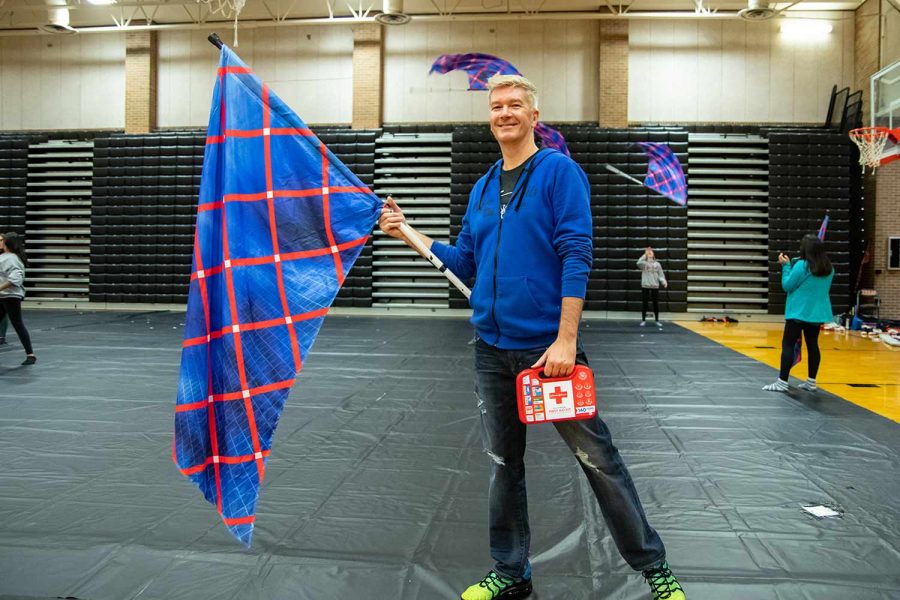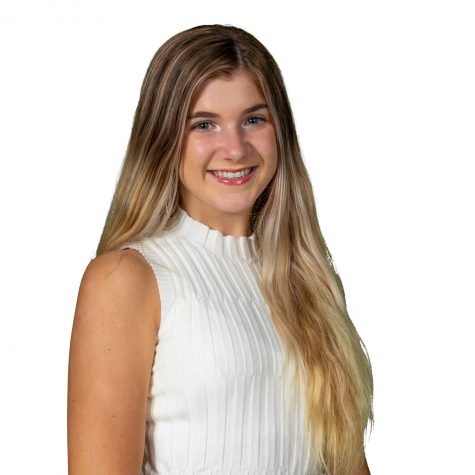Tossing flags and switching badges
Color guard director shares experience working two jobs
Photo by Peyton Sims
Photo Illustration
February 28, 2020
The alarm clock rings at 5 a.m. to begin another one of his hectic days. Before he walks out the door, he slips on his LifeNet jacket, preparing to answer the calls of people in need. His day is filled with the constant ringing of the phone and dispatching of ambulances.
As that part of the day winds down, another begins. His LifeNet uniform transforms into the outfit of a color guard director as he walks through the doors of the school, flag in hand.
As a teenager, Brandon Sams went to Fouke High School and was denied the opportunity to join their color guard because of his gender. Despite his rejection, he began to train himself at home and pushed himself to become better.
Because of his hard work, he was accepted into one of the greatest Drums Corps International(DCI) organizations, the Blue Devils. People from all over between the ages of 16 and 21 come together to form a professional marching band to compete. It is a three month obligation that tours all over the United States.
“My first season of marching band I had to play the tenors,” Sams said. “After that year, I decided that I really wanted to do color guard because I started watching drum corps on the television. I decided that’s what I really love and what I should be doing. I didn’t know much [about color guard] and didn’t have a teacher, so I watched videos and programs on the TV, trying to make it look exactly like what I saw.”
Although his high school director wouldn’t let him join guard, Sams was able to get a recommendation of where to audition. At the audition, all that was required is a knowledge of the basics, and the people hosting the audition will do the rest.
“My [high school] director gave me an idea of where to go, so I went and auditioned. That’s where it all started,” Sams said. “When you go to a larger audition, they teach you what they want you to know, but you should have an idea of the basics. I started marching at the age of 15 and aged out at the age of 21 as a world champion.”
Sams was with the Blue Devils as they won first place and became world champions. Sams still remembers this day as one of his greatest memories as he realizes that all of his hard work had finally paid off.
“We traveled on a charter bus all over the United States, going from city to city, performing on different nights and having days off to rehearse and change things to make them better,” Sams said. “When you have an audience of 40,000 people stand on their feet and clap for something you worked all summer for, it’s this feeling that you can’t get anywhere else.”
After his many adventures with the Blue Devils, it was time for Sams to begin a new chapter of his life. He went to school full-time to become a paramedic and worked on the weekends. This is where he learned a few skills he uses in his everyday life today.
“When I was in college, I was going to school five days a week, classes Monday through Thursday and clinicals on Friday,” Sams said. “I worked 16-hour days on the weekends. Time management, being able to see [my] goal and working hard till I got where I wanted to be, has impacted everything I’ve done.”
Sams began working in Florida until he felt the need for change in his life. With some hesitation, he took huge leaps from Fouke to Florida and finally, across the ocean to Dubai.
“I heard about the job in Dubai from a friend of mine when I worked in paramedics at St. Pete’s, Florida,” Sams said. “She found the job online, and after deciding to go, she said I should come with her, and I did. I did the phone interview, got hired, and was told to be there in about a month. I had no obligations here at the time and decided this was going to be a one time opportunity, so I took it.”
It was intimidating to leave familiarity behind to start a new adventure in a different country. Once he got there, Sams adjusted quickly to this change of scenery as he began to soak in the atmosphere Dubai had to offer.
“It was a little scary at first thinking that I was going to a faraway country and wasn’t going to be anywhere near my family, but I guess I’m pretty adventurous,” Sams said. “I decided to take my chance because I knew it probably would never happen again. It was an amazing experience working with people from all over the world. There were people from South Africa, Ireland, England, Australia, New Zealand, Jordan, the Philippines, and not to mention, the local people. It was a melting pot of all different kinds of people.”
Sams had to leave Dubai and come back to the United States to care for his sick grandmother. He began working as a paramedic dispatcher for LifeNet, helping people on the scene until the closest ambulance can get there.
“I came back home from Dubai because my grandmother has become ill, and she can’t take care of herself,” Sams said. “I work a rotating schedule, so I work 12 hour shifts three days one week and four days the next. After that, I go home, take care of my grandmother and take care of the things she can’t.”
Sams realized that something was missing in his life, so he began seeking out schools in need of a color guard director. He always knew that he wanted to teach guard and give kids the opportunity to be better inside and outside of color guard. He was inspired by the people that taught him when he was younger and wanted to have that same impact on students.
“I wouldn’t know what to do if I didn’t have [color guard] in my life,” Sams said. “I sought this school out because I knew I needed to put what I learned to work for others who will take what I can give them and apply it to their life, just like people did with me when I was young. I wasn’t 100 percent whole until I came here to teach.”
With all the responsibilities Sams has taken on, he has to stay organized. His drum corps past has given him the skills to tackle all parts of his life with minimal stress.
“I need to know my schedule,” Sams said. “It is a lot of time management, but I learned that through the drum corps. Having set schedule in front of you and knowing that you have to be at rehearsal at this time, eat at a certain time or be ready and get on the bus at this time helped me a lot in developing a way to organize my time wisely, so I can get everything I need to done in the time that I have.”
Sams also lives in a condo in Thailand for a few months out of the year. The marching band program there is popular, so it wasn’t difficult to find a color guard in need of a director. He faces daily challenges working with the guard in Thailand because of the language barrier but has found a way to overcome these obstacles.
“I have been teaching my guard in Thailand for about four years now, and I enjoy it a lot,” Sams said. “There’s a lot of challenges with the language, but art is a language that almost everyone can understand. I have a lot of people that helped with translations that also help with the show design and program coordinating.”
At the beginning, Sams never realized how important guard would be to him. It taught him not just skills but important qualities that would help him thrive and work to get where he is today.
“I wouldn’t be who I am if it wasn’t for guard, and I wouldn’t be as strong as I was mentally or physically,” Sams said. “I don’t know where I would be if all of this hadn’t taken place because everything I have learned from [guard] has allowed me to be brave, resilient, and work hard to do the things I’ve done.”
















